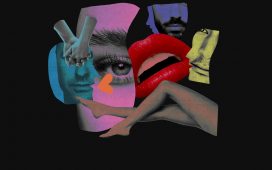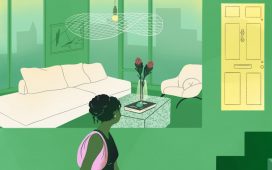With a certain liberal arrogance, many took a racist fabrication from Donald Trump at last week’s Presidential debate to be the evening’s crowning gaffe. In the Rust Belt town of Springfield, Ohio, “they’re eating the dogs. . . . They’re eating the cats. . . . They’re eating the pets of the people that live there,” Trump said. The pronoun in question referred to Springfield’s Haitian community, and the claim repeated a conspiracy theory that had been circulating on the right-wing Internet, channelling the centuries-long persecution of Haitians and West Indians. Not that it mattered—Trump’s comment was an instant bipartisan hit. As Springfield residents have retreated from much of ordinary life this week amid threats of violence, including bomb threats to schools and hospitals, social media has been flooded with upbeat videos of perplexed-seeming pets “reacting” to Trump’s remarks. His words have been placed next to images of Snowball and Santa’s Little Helper, the cat and dog from “The Simpsons” (set in Springfield, U.S.A.); the audio has been remixed into a danceable beat. Trump supporters, meanwhile, have used their own memes to play up the notion of Trump as a crusader for the nation’s furry friends with slogans like “SAVE PETS VOTE TRUMP” and related imagery, almost certainly generated by a text-to-image program like DALL-E, such as one animation showing Trump jogging toward the viewer with a cat on either biceps while a computer’s approximation of Black people chase behind. These images’ authors and their audiences have not forgotten the goal of stoking anti-immigration sentiment, even if other posters, engrossed in winning attention with snapshots of their real-life pets, have. Trump’s running mate, J. D. Vance, who helped make Springfield an anti-immigrant flash point, has acknowledged the political utility of so many pet jokes, urging “patriots” to “keep the cat memes flowing.”
Because we live in unremitting times, this was not the only recent collision between cats and election season. Directly after the debate, Taylor Swift endorsed the Harris-Walz ticket with a message on Instagram accompanied by a picture of her hugging her pet feline, Benjamin Button. She signed off “Taylor Swift, Childless Cat Lady,” referencing Vance’s gripe that Democratic leadership has been beset by unfruitful bodies who have therefore forfeited their stake in the country. Swift refrained from cross-posting her endorsement to X, where, as on Trump’s social platform Truth Social, manufactured images falsely depicting her as a Trump supporter have run rampant. Yet Elon Musk, never content to be excluded from a gathering to which he wasn’t invited, replied on his social platform anyway, with the message, “Fine Taylor . . . you win . . . I will give you a child and guard your cats with my life.” The conjunction within that nauseating offer discloses the conservative thinking that adheres these two cat controversies. The spinster and the savage are both tropes in service of a Christian ethnonationalism underwritten by anti-immigrant and anti-abortion policy; compulsory pregnancies and subjugated minorities feed the same ends. Yet only one of the recent pet remarks triggered resounding offense on behalf of the humans they targeted. Famous names from Jennifer Aniston to Pete Buttigieg rose to defend those who haven’t given birth (albeit many did so with a strange, strained emphasis on the maternal qualities of those—such as Kamala Harris—who parent children but haven’t procreated, and the fertility challenges that prevent some of them from doing so). Trump’s Springfield comment, by contrast, has mostly been played for laughs. In one instance, people became the story; in the other, we were content to focus on the pets. One South African musician released a song called “Eating the Cats ft. Donald Trump (Debate Remix),” with a cheery note that royalties from streams would go to a Springfield-based animal charity. At a rally held in Michigan last week, as Tim Walz chuckled along with supporters’ chant of “We’re not eating cats,” the “they” accused of doing so—Haitians—seemed decidedly lost in the “we” of the Democrats’ big tent.
Like Republicans and Democrats, cat people and dog people are more alike than not—they are pet people, which is not so much an identity as an arrangement that joins people to their animals through that historical process called domestication, in which wild things are made dependent on human companionship. The fact that they need us to survive might account for a certain strain of inhumanity among professed pet-lovers—namely, the rabidity with which big hearts assert the primacy of animals, our animals, over the people around us. In turn, the pets who exist as living property never look quite as captive as when their adorers insist they are like family. This discomfiting paradox was the subject of another recent controversy outside the realm of politics, over a personal essay included in an issue of New York centered on the ethics of pet ownership. The piece, titled “Why Did I Stop Loving My Cat When I Had a Baby?,” charts the author’s postpartum neglect of her pet cat Lucky, with such low points as Lucky drinking from the toilet because the writer failed to refill her water bowl and gaining so much weight that she could no longer properly groom herself. “Basic needs went unmet,” the author writes frankly. Despite its bracing titular question, the essay is undercooked and dissatisfying in the way of most essays destined to get readers and Internet bystanders in a lather. Sure enough, righteous fury poured forth from animal-lovers. A Change.org petition with more than forty thousand signatures demanded an update on Lucky’s condition, while nonetheless managing to emphasize the feelings of the humans concerned for her: “Not knowing the current condition of Lucky—whether safe and in good care, is causing unnecessary emotional anguish for many.” Some called for police intervention, while cooler heads wondered why the author hadn’t simply rehomed her cat. (I do wonder if they have observed the vitriol that some pet-lovers reserve for owners who do attempt to do so.) Under pressure, New York finally appended an editor’s note to the piece last week, clarifying that Lucky has been given a clean bill of health from not one but two veterinarians, but some commenters remained unassuaged.
I—childless, petless—found myself sympathizing with the author’s domestic burdens, and her desire for one less thing with needs. A sturdier version of the piece would expose the consequence of transitioning from one archetype to another: when the cat lady becomes a mother, at least in a nation that does not support caretaking labor, the cat becomes an indulgence that she cannot afford. This is the problem of growing up, she thinks, of evolving from a “lonely 24-year-old” into a thirtysomething woman with proper responsibilities, a baby and a husband (who is, by the way, conspicuously absent from the Lucky caretaking drama). In light of the past week’s fixations, I’m tempted to think of the New York essay as an unwitting wrench in the conservative dogma uniting those other two pet controversies. For Lucky’s owner, it was the leap toward convention in a nuclear American family unit that brought misery to the household pet. What put Lucky at risk was the very thing J. D. Vance wants to enshrine. As with so many American dangers, the real threat came from inside the house. ♦








